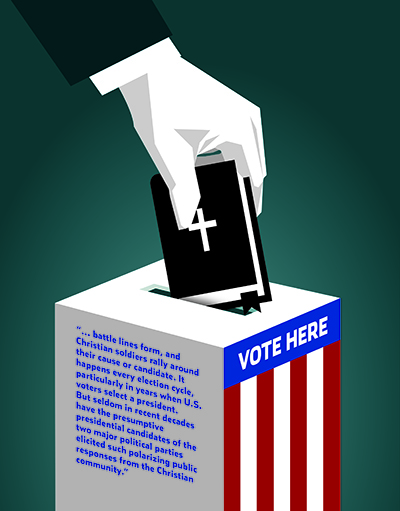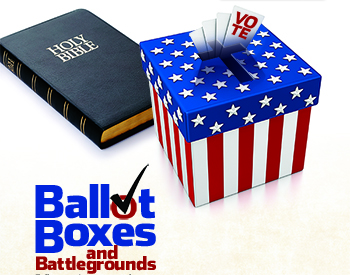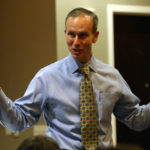“There’s a sweet, sweet spirit in this place,” the congregation sings on Sunday morning. And it’s often true—right up until somebody says something about politics.
Then battle lines form, and Christian soldiers rally around their cause or candidate.
It happens every election cycle, particularly in years when U.S. voters select a president. But seldom in recent decades have the presumptive presidential candidates of the two major political parties elicited such polarizing public responses from the Christian community.
‘Antithesis of Christian values’
“Donald Trump’s message and the way he communicates it is the antithesis of Christian values, and it is time for faith leaders to say so,” according to “Called to Resist Bigotry—A Statement of Faithful Obedience,” a public statement denouncing the Republican presidential candidate.
More than 50 religious leaders signed the statement, including David Gushee, Baptist ethicist from Mercer University; Frederick Haynes, senior pastor of Friendship West Baptist Church in Dallas; and Raphael Warnock, senior pastor of Ebenezer Baptist Church in Atlanta.
Positions labeled ‘evil, evil, evil’
Not that the Democratic frontrunner has escaped the wrath of some ministers, particularly religious social conservatives. Robert Jeffress, pastor of First Baptist Church in Dallas, labeled Hillary Clinton’s positions as “evil, evil, evil” in an appearance on Fox News.
Jeffress serves on an evangelical outreach advisory board for the Trump campaign—a group that also includes Jack Graham, pastor of Prestonwood Baptist Church in Plano; Ronnie Floyd, Arkansas pastor and immediate past president of the Southern Baptist Convention; and Richard Land, president of Southern Evangelical Seminary and former president of the SBC Ethics & Religious Liberty Commission.
Sign up for our weekly edition and get all our headlines in your inbox on Thursdays
Additional articles from this series:
Editorial: How to survive a rugged political season
George W. Truett on religious liberty
Former editors speak on Christian citizenship and religious liberty
Mobilizing advocates for Texas schoolchildren
None of the above
Then there are some evangelical Christians, like Russell Moore, current president of the Ethics & Religious Liberty Commission, who don’t like either option.
“What we have in the Donald Trump phenomenon as well as in the Hillary Clinton phenomenon is an embrace of the very kind of moral and cultural decadence that conservatives have been saying for a long time is the problem,” Moore wrote in an op-ed article for the New York Times. Both Trump and Clinton represent “an amoral sort of vision of America that isn’t what we believe in,” he added.
In an opinion article for Christianity Today, Moore did not specifically name either Trump or Clinton. However, he presented a situation in which one candidate was “pro-life but a race-baiter,” running against a pro-choice candidate. In that instance, he suggested voting for a third-party or write-in candidate.
“When Christians face two clearly immoral options, we cannot rationalize a vote for immorality or injustice just because we deem the alternative to be worse,” he wrote.
Throwing away a vote
Jeffress disagreed strongly with that perspective.
“I think it is a very foolish decision for conservative Christians to stay at home and not vote or to write in the name of Jesus Christ or Mickey Mouse for an alternate candidate,” he said in an interview. “That is to throw your vote away. … There are no perfect politicians any more than there are perfect pastors. But I believe there really is no dilemma for conservative Christians in this election.”
(CommonCall requested interviews with Moore and Graham. A spokesperson for Moore said he was traveling overseas and unavailable. A spokesperson for Graham said he was on vacation and could not respond.)
Be truthful, loving and respectful
 Brent Walker, executive director of the Baptist Joint Committee for Religious Liberty in Washington, D.C., acknowledges Christians differ in their political views, but he insists they have a responsibility to speak truthfully, lovingly and respectfully.
Brent Walker, executive director of the Baptist Joint Committee for Religious Liberty in Washington, D.C., acknowledges Christians differ in their political views, but he insists they have a responsibility to speak truthfully, lovingly and respectfully.
“It’s OK to debate vigorously. That’s how a vital democracy works,” Walker said. “The real question is how we’re going to debate. It may be too much to expect all American citizens to live up to the highest plane here, but I don’t think it is too much to expect Christians and other people of faith to do so.
“We have an obligation to model how we conduct ourselves when tending to the affairs of our country—although we are sometimes the worst offenders.”
- If setting the tone for Christian political activism begins with religious leaders—particularly pastors—what guidelines should govern their political involvement?
Trey Graham, pastor of First Baptist Church in Melissa, a congregation uniquely aligned with the Southern Baptists of Texas Convention, and host of the “Faith Walk” and “Smart Talk” programs on Christian radio, has strong opinions on the subject.
“I am a citizen of the United States. I am a veteran of the U.S. Army. I served my country in uniform. I care about my country. I have the constitutional right to vote, the constitutional right to have my voice heard at the ballot box and in the political square. I do not believe I relinquish those rights because I am a pastor,” Graham said.
“So, from the citizenship perspective, I have a voice, and I want to use that voice. As a spiritual leader, as a pastor, I believe I have a calling to educate people biblically and culturally. And so, I teach in church and on the radio about cultural issues and how they reflect or don’t reflect the nature of God and the word of God.”
Voice not silenced
Graham does not endorse candidates from his church’s pulpit, although he encourages his church members to “find the candidates who best match their biblical values,” he said. But speaking as a private citizen, he feels free to offer endorsements, although he hasn’t yet in this year’s presidential race.
“I don’t believe my voice should be silenced because I am also called to be a pastor,” he said. “I also believe those who reject God, who reject the word of God, will be involved politically and will have their voices heard. So, we who love God and love the word of God willingly silence ourselves if we choose not to be involved. If the people who are anti-Jesus are going to speak up, I think the people who are followers of Jesus should also speak up.”
Jeffress strikes a similar note.
“I think every minister ought to be involved in the political process,” he said. “‘Politics’ is not a dirty word, contrary to what some people think. … I believe as pastors and Christians, we ought to influence the culture we live in, and the political process is one way we do that.”
From the Revolutionary War, to the abolition of slavery, to the Civil Rights Movement of the 1950s and 1960s, U.S. ministers led social causes and influenced the public square, he noted.
“So, I believe pastors should not shirk away from preaching and talking about issues that are important, and they ought to be encouraging their church members to get involved in the political process,” Jeffress said.
Issues, yes. Candidates, no.
True, pastors have the right—perhaps even the responsibility—to address moral and ethical issues that have political implications, Walker agreed. But when they publicly support or oppose political candidates, it gets trickier, particularly regarding the church’s 501(c)(3) nonprofit status with the Internal Revenue Service.
“They certainly can speak out on and lead a discussion in response to the issues of the day, even if many—if not all of them—are decidedly in a political context,” Walker said. “But, of course, unless they are willing to jeopardize the tax-exempt status of the church, they should not—when speaking on behalf of the church—endorse or oppose candidates. So, the dividing line is: issues ‘yes,’ candidates ‘no.’
“Ministers in their individual capacities, when they are not purporting to speak for the nonprofit, can become involved in electioneering activities to endorse or oppose candidates without endangering the tax exemption. They have that right.
“If they do that, though, … they need to make it clear in their involvement that they are doing this individually and disclaim any intent on their part to cause their church to oppose or endorse a candidate. It is purely a personal matter.”
Where to draw the line
But the lines between prophetic, pastoral and personal sometimes are difficult for ministers to draw and for their church members to discern.
Walker recalled a pastor who asked him to look at a sermon on Saturday he planned to preach the next morning. The sermon “had some pretty hard-hitting things to say about Trump” and quoted what the minister considers some of the candidate’s most outrageous and egregious statements.
“I got back to him and said, ‘You know, you can make your point and even say, ‘These expressions of opinion are antithetical to my understanding of what it means to follow Jesus,’” Walker said.
“But you ought to at least, No. 1, not mention Trump by name, and No. 2, after the benediction or somewhere in the service, make the speech: ‘We are getting into election season. I am going to be speaking prophetically from my heart. These are my opinions. I am speaking to the church, not for the church. Please understand these are just my opinions, and the church itself does not take sides in political campaigns.’”
Ministers reach different conclusions about how outspoken they should be regarding candidates.
“How involved should a pastor get with any particular candidate? I think every pastor ought to make that choice himself,” Jeffress said. “For example, I never endorse candidates from the pulpit. I would never do that. But, obviously, from my external involvements and television appearances, people know personally how I feel about this election.”
And that’s the challenge.
- How can ministers speak prophetically to moral issues with political expressions when certain issues become clearly identified with specific candidates?
“It’s tough, particularly in election season,” Walker said. “It’s easier to speak on issues a year before the election than it is to speak a week before the election. The issues sometimes line up with the candidates. Even though you don’t say ‘Candidate X’ or ‘Candidate Y,’ if you’re talking about ‘Issue A’ or ‘Issue B,’ people can put two and two together and figure out the answer to the equation.”
Some ministers have no problem with their members making the connection between their pastor and a political figure, and they don’t shy away from addressing issues out of fear they will appear implicitly to endorse or oppose a candidate.
“There’s no way to avoid it. You shouldn’t have to avoid it,” Jeffress said. “Look, I’m very clear. I’m a pro-life Christian. And in this election, we’ve got one candidate—Donald Trump—who is pro-life and another candidate—Hillary Clinton—who admittedly says she is for unfettered access to abortion. … Now, if I preach that we ought to elect a pro-life candidate, I don’t have to mention Donald Trump’s name. Everybody knows who I’m talking about, because there is only one pro-life candidate running for president of the United States.”
- How is that different than endorsing a candidate?
“It’s all in the word. We don’t use the word ‘endorse’ because of the Internal Revenue Service,” Jeffress said. “But no Christian pastor ought to shirk away from talking about the issues and saying we ought to elect a candidate—a president—who is pro-life and who is pro-religious liberty.
“People can make up their mind about who is the pro-life candidate if they want to. But if you are saying that advocating ‘we ought to elect a pro-life candidate’ is endorsing a candidate, I don’t believe the IRS looks at it that way. And if they do, too bad. We have a moral responsibility to encourage our people to vote for biblical principles.”
- If from all appearances, the minster is endorsing a candidate as an individual, and then the minister preaches on issues clearly identified with a specific candidate, is that crossing the line?
“I think so, and I think the IRS would think it is crossing the line. But personally, I’m really torn on that,” Walker acknowledged. “I believe in a free pulpit. I believe what a minister says in the pulpit is speaking to the church, not on behalf of the church.
“So, there’s a part of me that says as long as you don’t name the name or say, with a wink and a nod, ‘Folks, I want you to go vote for who you know I’m thinking about,’ because of the way you understand these issues—as long as you don’t do that, I’m pretty comfortable with that, but I don’t think the IRS is going to be comfortable with it.
“That said, apparently, the IRS is not doing a lot to enforce that ban on electioneering—on either side of the aisle—here of late. But the fact that there appears not to be enforcement does not mean we can flout it. We ought to go by what the law says, rather than out of fear of being punished.”
But not everything legally permissible is necessarily wise, Walker noted.
“Most congregations I am familiar with have differences of opinion on political issues and even underlying policy issues, as well. So, the minister ought to be careful in considering whether he or she wants to venture into those waters, even though it is permissible or legal, because of the potential for disruption in the community,” he said.
- How can ministers help maintain harmony within a congregation during a politically divisive election cycle?
It may require potentially difficult conversations.
“Because I knew what my involvement was going to be, I made it a point in our church one Sunday back in January before the first primary, to explain why I was personally getting involved in this election season,” Jeffress said.
 “I said: ‘I am going to make a pledge to you. I will never bring politics into the pulpit, and I will never bring my choice of a candidate into the pulpit. I will leave my politics outside the church door.’ But I said: ‘I want you to make the same commitment to other believers in this church that, regardless of your personal feelings, you will leave your politics outside the church, as well. And when we come together, the only leader we will talk about is the leader who can make a true change, and that’s Jesus Christ.’
“I said: ‘I am going to make a pledge to you. I will never bring politics into the pulpit, and I will never bring my choice of a candidate into the pulpit. I will leave my politics outside the church door.’ But I said: ‘I want you to make the same commitment to other believers in this church that, regardless of your personal feelings, you will leave your politics outside the church, as well. And when we come together, the only leader we will talk about is the leader who can make a true change, and that’s Jesus Christ.’
“As long as a pastor doesn’t bring it into his pulpit, if people have a problem with his particular choice, they just have to get over it.”
Committed to common values
Many problems in a congregation can be avoided if members share a strong commitment to a common set of values, Trey Graham noted.
“Our first citizenship is in heaven. Our first and only allegiance is to Jesus. And our standard for values—our standard for morality—is the word of God,” he said. “God is not a Republican or a Democrat. He’s not an American. He’s bigger than all those things. … So, we promote unity because we are unified around the truth of Scripture and the truth of Christ.”
Agree to disagree in love
Emphasis on matters that unite church members rather than divide them does help, Walker agreed.
“Talk about core gospel issues—what it means to be a Christian, what it means to follow Jesus,” he said. “Talk about the importance of good citizenship—not just rendering to God, but rendering to Caesar, too. We have that obligation. Talk about what unites us rather than divides us first.
“Even before that, if the congregation is healthy to start with, there are a lot of personal relationships among members. If that is well established, and you talk about what unites you rather than divides you, it goes a long way toward healing potential divisions.”
Once that is established, Walker suggested a forum on a Sunday evening or Wednesday night where members can discuss their views in a mutually respectful way.
“And once everybody has had their say, you may just have to say, ‘OK, folks, we love one another, but we are just going to have to agree to disagree,’ and not beat it to death,” he said.
This article first appeared in CommonCall: The Baptist Standard Magazine. An annual subscription is only $24 and comes with two complementary subscriptions to the Baptist Standard. Subscribe today.















We seek to connect God’s story and God’s people around the world. To learn more about God’s story, click here.
Send comments and feedback to Eric Black, our editor. For comments to be published, please specify “letter to the editor.” Maximum length for publication is 300 words.